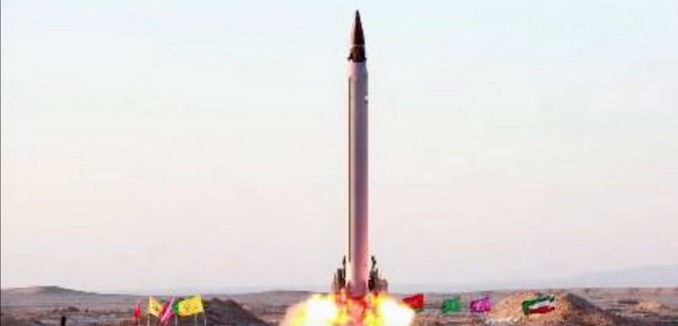In an effort to fix the weaknesses in the 2015 nuclear deal with Iran, a new working group tasked with forming a joint United States-European Union position on Iran’s ballistic missile program “must produce nothing less than a commitment to reimpose tough sanctions on Iran” if it continues to develop ballistic missiles, two experts on Iran wrote Tuesday in Foreign Policy.
Behnam Taleblu, a senior Iran analyst at the Foundation for Defense of Democracies (FDD), and Richard Goldberg, a senior advisor at FDD wrote that despite growing differences between the U.S. and EU regarding Iran’s missile program, President Donald Trump should reject Iran’s pledge to limit the range of its missiles to 1,243 miles (2,000 kilometers).
Towards that end, Taleblu and Goldberg argue that the U.S. must make clear that Iran possesses the Middle East’s largest ballistic missile arsenal, which poses both a conventional and unconventional threat to its neighbors. A significant number of the missiles are capable of carrying nuclear payload. Iran, they note, “continues to flagrantly ignore” demands in United Nations Security Council Resolution 2231 that calls on it to stop developing technology for ballistic missiles “designed to be capable” of delivering a nuclear warhead.
Both the U.S. and the Europeans must develop an accurate assessment of Iran’s missiles’ capabilities by sharing intelligence. The U.S. should also warn the Europeans that the longer range ballistic or cruise missiles Iran might develop or acquire could threaten European territory if launched from the edges of Iranian territory.
Both sides should also develop a joint goal for Iran’s missile program and insist on a rollback of Tehran’s missile program.
Because of terms in the nuclear deal, within five years, Europe is committed to lift sanctions on the companies at the heart of Iran’s missile program. If, however, Europe is convinced of the threat posed by Iran’s missiles, it could be convinced to maintain these sanctions indefinitely.
Finally, the U.S. and EU should agree that if Iran continues to defy the Security Council on its missile development, they should be willing to impose the toughest sanctions on Iran, as the nuclear deal should not restrict the West from imposing non-nuclear sanctions on Tehran.
“Iran’s leaders clearly do not feel hamstrung by the JCPOA to expand its missile program,” Taleblu and Goldberg conclude. “Likewise, the West should not feel hamstrung by the JCPOA to respond in kind.”
In a similar vein, Benny Avni reported for the New York Post that U.S. Ambassador to the United Nations Nikki Haley is working to convince Europeans to take as stronger stand against Iran.
Recent evidence that Iran is exporting arms to Houthi rebels in Yemen, Avni observed, show that Iran is “brazenly” violating the nuclear deal “because the only rules that apply” in the nuclear deal are those set out “in the Security Council resolution,” which prohibits Iran from exporting weapons.
By pointing this out, Haley might “chip away” at the repeated assertion that Iran is complying with the nuclear deal. While Avni is skeptical that Haley will convince all Europeans of the need to challenge Iran, he noted that French Ambassador Francois Delattre told reporters that his country would look to addressing the ballistic missile issue with Iran.
[Photo: TomoNews US / YouTube ]




